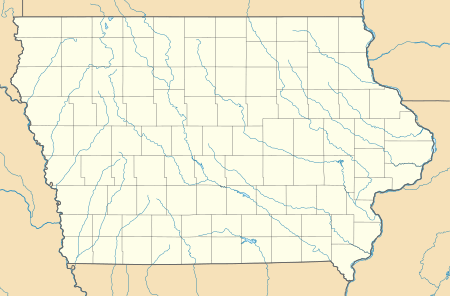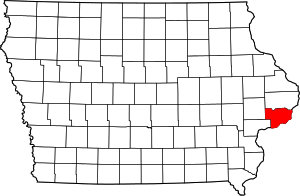Hiller Building
The Hiller Building, also known as the Schick Apartments, is located on the edge of downtown Davenport, Iowa, United States. The Federal style building is a row house. It was individually listed on the National Register of Historic Places in 1974.[1] In 1983 it was included as a contributing property in the West Third Street Historic District.[2]
Hiller Building | |
 | |
  | |
| Location | 310-314 Gaines St. Davenport, Iowa |
|---|---|
| Coordinates | 41°31′22″N 90°34′59″W |
| Area | less than one acre |
| Built | 1852, 1856, 1859 |
| Architectural style | Federal |
| Part of | West Third Street Historic District (Davenport, Iowa) (ID83003741) |
| MPS | Davenport MRA |
| NRHP reference No. | 74000810[1] |
| Added to NRHP | July 24, 1974 |
History
The property on which the building stands is in the oldest section of the city.[3] It was purchased by John Hiller from Davenport founder and developer Antoine LeClaire in 1847. Hiller himself was a builder who is responsible for the construction of the Clock Tower building on the Rock Island Arsenal. This row house was built in three sections in 1852, 1856, and 1859. The expansion reflected the city's population explosion in the 1850s.[4] Because there was a need for rental properties, Hiller expanded his own home and rented out the extra rooms. It is not certain which of the three sections is the original.[3] The Schick family bought the building from the Hillers in 1902. It is believed that this is one of the oldest extant buildings in Davenport.[3]
The building has sat empty since 2015 and it has been on Davenport's "repair or demolish" list since 2016.[4] Its south wall is bowing, crackling and it is losing some of its stones. Jamey Licandro bought the property in 2020 and plans to shore up the structure and renovate the building for apartments as he has done to other historic buildings in the city. Also in 2020, the building was included as one of nine "most endangered" properties in the state by Preservation Iowa.
Architecture
The two-story rectangular structure houses apartments that are symmetrically arranged along interior corridors.[3] The north wall is composed of stone laid in ashlar fashion and covered in stucco. There are rough irregular shaped stones on the basement level and on the upper two floors of the main façade. The north side of the façade features stone pilasters with mock capital wood crowns that flank the entranceway. The northeast corner has stone quoins. The sidewalls and one in the middle are stepped at the top and the structure is topped with a gabled roof. For the most part, the interior retains its original layout and woodwork, including staircases.[4]
References
- "National Register Information System". National Register of Historic Places. National Park Service. March 13, 2009.
- Martha Bowers, Marlys Svendsen-Roesler. "West Third Street Historic District". National Park Service. Retrieved 2015-03-20.
- Jill Eastin. "Hiller Building". National Park Service. Retrieved 2015-02-08. with photo
- Alma Gaul (July 18, 2020). "John Hiller building, historic Davenport apartments, await restoration". Quad-City Times. Davenport. Retrieved 2020-07-19.
